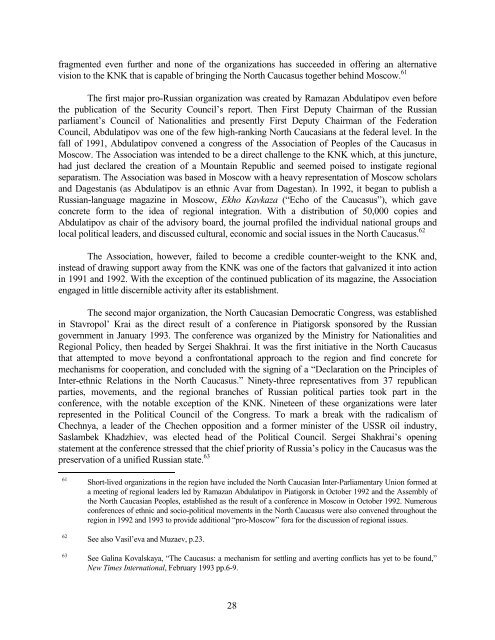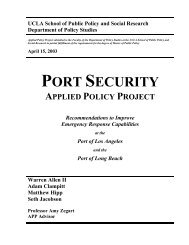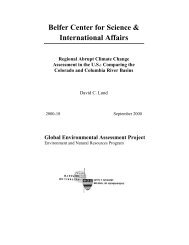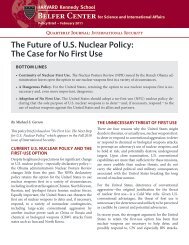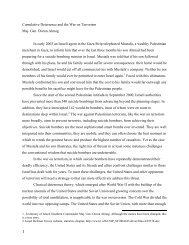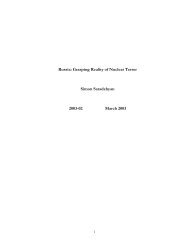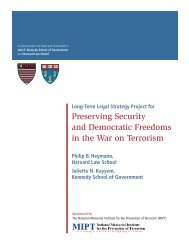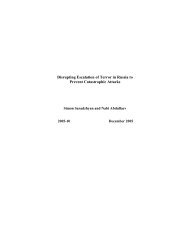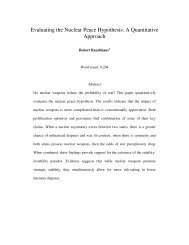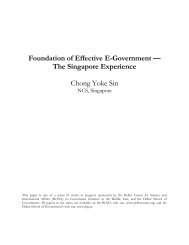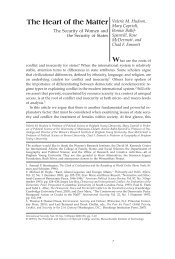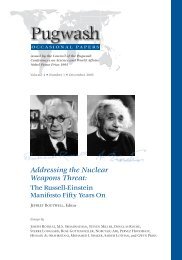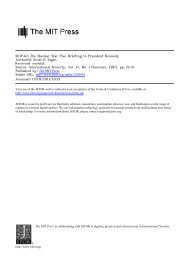RUSSIA'S TINDERBOX - Belfer Center for Science and International ...
RUSSIA'S TINDERBOX - Belfer Center for Science and International ...
RUSSIA'S TINDERBOX - Belfer Center for Science and International ...
You also want an ePaper? Increase the reach of your titles
YUMPU automatically turns print PDFs into web optimized ePapers that Google loves.
fragmented even further <strong>and</strong> none of the organizations has succeeded in offering an alternative<br />
vision to the KNK that is capable of bringing the North Caucasus together behind Moscow. 61<br />
The first major pro-Russian organization was created by Ramazan Abdulatipov even be<strong>for</strong>e<br />
the publication of the Security Council’s report. Then First Deputy Chairman of the Russian<br />
parliament’s Council of Nationalities <strong>and</strong> presently First Deputy Chairman of the Federation<br />
Council, Abdulatipov was one of the few high-ranking North Caucasians at the federal level. In the<br />
fall of 1991, Abdulatipov convened a congress of the Association of Peoples of the Caucasus in<br />
Moscow. The Association was intended to be a direct challenge to the KNK which, at this juncture,<br />
had just declared the creation of a Mountain Republic <strong>and</strong> seemed poised to instigate regional<br />
separatism. The Association was based in Moscow with a heavy representation of Moscow scholars<br />
<strong>and</strong> Dagestanis (as Abdulatipov is an ethnic Avar from Dagestan). In 1992, it began to publish a<br />
Russian-language magazine in Moscow, Ekho Kavkaza (“Echo of the Caucasus”), which gave<br />
concrete <strong>for</strong>m to the idea of regional integration. With a distribution of 50,000 copies <strong>and</strong><br />
Abdulatipov as chair of the advisory board, the journal profiled the individual national groups <strong>and</strong><br />
local political leaders, <strong>and</strong> discussed cultural, economic <strong>and</strong> social issues in the North Caucasus. 62<br />
The Association, however, failed to become a credible counter-weight to the KNK <strong>and</strong>,<br />
instead of drawing support away from the KNK was one of the factors that galvanized it into action<br />
in 1991 <strong>and</strong> 1992. With the exception of the continued publication of its magazine, the Association<br />
engaged in little discernible activity after its establishment.<br />
The second major organization, the North Caucasian Democratic Congress, was established<br />
in Stavropol’ Krai as the direct result of a conference in Piatigorsk sponsored by the Russian<br />
government in January 1993. The conference was organized by the Ministry <strong>for</strong> Nationalities <strong>and</strong><br />
Regional Policy, then headed by Sergei Shakhrai. It was the first initiative in the North Caucasus<br />
that attempted to move beyond a confrontational approach to the region <strong>and</strong> find concrete <strong>for</strong><br />
mechanisms <strong>for</strong> cooperation, <strong>and</strong> concluded with the signing of a “Declaration on the Principles of<br />
Inter-ethnic Relations in the North Caucasus.” Ninety-three representatives from 37 republican<br />
parties, movements, <strong>and</strong> the regional branches of Russian political parties took part in the<br />
conference, with the notable exception of the KNK. Nineteen of these organizations were later<br />
represented in the Political Council of the Congress. To mark a break with the radicalism of<br />
Chechnya, a leader of the Chechen opposition <strong>and</strong> a <strong>for</strong>mer minister of the USSR oil industry,<br />
Saslambek Khadzhiev, was elected head of the Political Council. Sergei Shakhrai’s opening<br />
statement at the conference stressed that the chief priority of Russia’s policy in the Caucasus was the<br />
preservation of a unified Russian state. 63<br />
61 Short-lived organizations in the region have included the North Caucasian Inter-Parliamentary Union <strong>for</strong>med at<br />
a meeting of regional leaders led by Ramazan Abdulatipov in Piatigorsk in October 1992 <strong>and</strong> the Assembly of<br />
the North Caucasian Peoples, established as the result of a conference in Moscow in October 1992. Numerous<br />
conferences of ethnic <strong>and</strong> socio-political movements in the North Caucasus were also convened throughout the<br />
region in 1992 <strong>and</strong> 1993 to provide additional “pro-Moscow” <strong>for</strong>a <strong>for</strong> the discussion of regional issues.<br />
62 See also Vasil’eva <strong>and</strong> Muzaev, p.23.<br />
63 See Galina Kovalskaya, “The Caucasus: a mechanism <strong>for</strong> settling <strong>and</strong> averting conflicts has yet to be found,”<br />
New Times <strong>International</strong>, February 1993 pp.6-9.<br />
28


